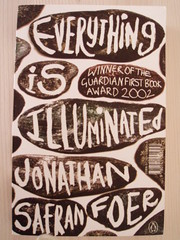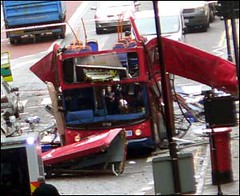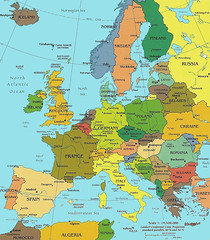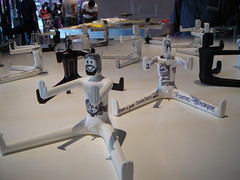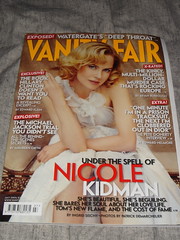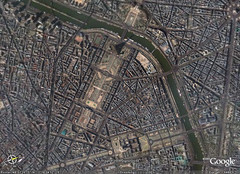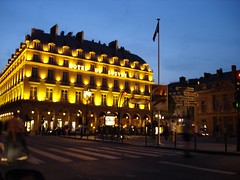Friday, July 29, 2005
We are all a bit twisted
On the plane I finished The Curious Incident of the Dog in the Nightime by Mark Haddon. My sister read it before me and she was very interested in hearing my opinion. The story is about Christopher Boone, a 15-year-old boy from Swindon (UK) who has a severe Asperger's syndrome meaning that he is not very good in understanding jokes, metaphors or the emotions of others. He also does not like touching or loud noise or unexpected situations. Things have to be scheduled and in order. Christopher is very good in logical thinking.
I disliked the book in the beginning because I felt it was another attempt to make mental disabilities into something funny and exotic. But I am glad that I continued reading. The book is a superb description of the disruptive nature of our society. It also reminded me once again of the thought by Michel Foucault that only be examining the abnormal we are able to understand normality. Haddon writes with such skills that it is possible for the reader to relate to the dizzyness and nausea Christopher goes through when entering a railway or and underground station. Truly a recommendable piece of literature.
Monday, July 25, 2005
Wonderfully nonsense
"Why is everything here completely pointless?"
"Candy does not have to have a point. That´s why it´s candy."
Yes. I went to see Charlie and the Chocolate Factory yesterday. And that piece of dialogue sums up the film rather well. Just watch the trailer from the site and you´ll understand what I am talking about.
Two of my colleagues went to see it on Saturday, which meant that the first meeting of the week started with quoting the film:
"Don´t touch that squirrel´s nuts!"
(laughing)
"You´re really weird."
(laughing)
"Daddy, I want another pony."
(laughing)
Very amusing, wouldn´t you say. Especially for the people who haven´t seen the film.
Not to reveal too much, the film is absurd, cruel, funny, visually amazing and - did I already say that - funny. So quite like the books of Roald Dahl. I´d say that this movie is the most entertaining film I have seen for ages.
Friday, July 22, 2005
Reading
But to be honest and serious, this is a highly interesting set of questions. It is sometimes even a bit frightening how much reading tells about you. The book shelf is one of the first thing I want to see when going to someone's home.
How many books do you own? Montako kirjaa omistat?
Well, when I moved to Amsterdam I had to pack all my books into boxes. Most of them are in Helsinki at the attic of my parents. I think there were 4 big boxes. Here in Amsterdam I (already) have approximately 40-50 books.
Whats the last book you bought? Minkä kirjan ostit viimeksi?
Everything Bad Is Good For You by Steven Johnson. And some paperbacks.
Whats the last book you read? Minkä kirjan luit viimeksi?
I just love Flickr. It is absolutely amazing. How can it be that there was a picture of the last book I read? Jonathan Safran Foer's (amazing site!) Everything Is Illuminated. Bought it because my friend Jurjen recommended it. Before that I read Asko Sahlberg's Yhdyntä (Intercourse), which was sent to me by my dear friend Sanna.
Currently reading? Mitä luet juuri nyt?
I finished E.I.I. yesterday so I am sort of between books. I have four options: Abram de Swaan's Words of the World (linguistics, sociology), Federico Garcia Lorca's House of Bernardo Alba, Paulo Coelho's The Alchemist and Mark Haddon's The Curious Incident Of The Dog In The Night-Time. I also consider Narnia for a while but it is too obvious now, just before the film.
A book you've been reading for a long time but never got around to finishing? Mitä kirjaa olet lukenut kauan, mutta et ole saanut luettua loppuun?
Well, I have two. Jeremy Rifkin's The European Dream and Dietrich Schwanitz's Handbook of Bildung. I know I SHOULD read them but I always find something more interesting.
What 5 books have meant the most to you? Mitkä viisi kirjaa ovat olleet sinulle tärkeimpiä?
This is difficult but let's try.
Günter Grass: The Tin Drum (personal approach on war, beautiful language)
Charles Leadbeater: Up The Down Escalator - Why The Global Pessimists Are Wrong? (excellent approach on life that I am trying to adopt)
Eduard Uspenski: Down The Magic River (The Book of my childhood)
Tove Jansson: Muumipappa ja meri (Moominpappa at Sea) (a new approach on children's literature)
Norman Fairclough: New Labour, New Language? (inspiration to rhetorics)
Who would you like to book tag? Kuka on kirjahippa?
I have to say a few people: PG, my sister Teea and the brilliant woman behind Shirley blog.
Thursday, July 21, 2005
Better, much better
The European Commission published yesterday its new communication strategy. It is a set of actions attempting to improve the way the Commission communicates with the rest of society.
It would be easy to start bashing the document. But I will not. I read it today and I have to say that there´s a lot of improvement. The Commission acknowledges the mistakes in the past, encourages more dialogue between "normal" officials and the citizens and decides to recruit communication professionals to its staff. What pleases me greatly is that the problem in ownership is admitted. The Commission will publish later a White Paper on communication. They also suggest that EU officials would do internships in NGOs and that they would invest more on possibilities for student journalists to do an internship in the Commission.
The Swedish Communications Commissioner Margot Wallström told the press that she does not believe in spin. However, quite many of the actions are about spin, i.e. designing and professionalising media actions. They even mention the goal to have celebrities work as ambassadors of the EU message.
Wallström stresses the importance of listening, rightly so. The document also states that the concerns of citizens and civil society organisations must influence the decisions made. Good work. The part that is still a bit vague is the one on civil society communication. But for once, let´s give them a chance. It´s not easy. I think that if they really manage to make the Commission more open for dialogue, they´ve done a magnificent job. Let´s not shoot the bird before it has even left the cage and tried flying.
p.s. Something completely different: A colleague of mine found a new side from my last name. As I do not speak French, this did not pop into my mind. She calls me nowadays Tommi Milkio. Got the joke?
Wednesday, July 20, 2005
Proud to be pop
I am proud to be into popular culture. As a balancing comment, I am terribly bad in art or classical music. I don´t know who was the talk of the town during the Venice Biennale but I know what is L Word. And to be honest, I am not ashamed to admit it at this age. Although I would love to know more about high culture, that is for sure.
I meet often highly intelligent people who speak of culture but exclude popular culture. For me this approach is way too narrow. Popular culture deserves thorough research and analysis like other forms of culture. I just love reading good analysis on television like Steven Johnson´s book Everything Bad Is Good For You or the weekly entertainment columns of New Yorker magazine. Don´t get me wrong, I am not anti-art - far from it. I just feel that by raising interest in trends of popular culture we are able to understand better what happens in our society and how it can be improved.
Monday, July 18, 2005
Whose problem?
I read today an article by Thomas L. Friedman from the New York Times where he comments on the London bombings. The headline of his column is If It´s A Muslim Problem, It Needs A Muslim Solution.
I don´t know what to think of the text. He is concerned - and rightly so - of the risk of blaming the entire Muslim population for the attacks and by doing that growing the division to us and them. But at the same time he is calling for Muslim leaders to condemn the bombings more strongly. Friedman states: "Only the Muslim world can root out that death cult. It takes a village."
But which village? The London bombers were British citizens, people who would normally seem like well integrated members of the British society. Is it right to hold the leaders of the Muslim world responsible for this?
I am also slightly worried of the often seen mixup between words Muslim and Arab. They´re often used as synonyms although that is definitely not accurate. In the Dutch integration debate some non-Muslim Arabs who live in the Netherlands have found themselves from an awkward position when they´ve been asked to act as a voice for the Muslim community.
As the Dutch author Geert Mak rightly states in his pamphlet Gedoemd tot kwetsbaarheid (Doomed to vulnerability), we should know more about each other:
"On no account does this mean there can be no internal differences. The point is that people know enough about each other to negotiate, to find a way to work together, to reach a compromise."
Saturday, July 16, 2005
Troubling history
I had drink with a friend of mine yesterday. A German friend of his friend came to the bar and stuck in our company. With that expression I mean that his presence was not exactly desired. The guy was in his early 20s (unlike we, unfortunately) and tried to be superprovocative. Well, provocation turned into being highly annoying.
He made a joke, which wasn't exactly brilliant. I said something like that it is understandable because we all know how famous German humour is internationally. This guy asked where I was from. I told him that I am from Finland. His strike back was as follows:
"Well, don't you start that with me. Without us you would not exist. Without the Germans your grandfather would not be alive and you would not be standing here."
We went totally silent with my friend. We finished our drinks quite quickly and left the bar.
I do not want to exaggerate this. It was an idiotic comment by an individual, not a statement of a nation. I was just appalled and shocked that someone could make a joke like that. I sincerely hope that it was only ignorance that will fade out when he gets older. Especially in the Netherlands - with their quite strong anti-German attitudes - jokes like that are really dangerous. This also made me think of a comment my boss made once stating that my generation is the first one without the burden of the Second World War on our shoulders.
Friday, July 15, 2005
Art and me
To be honest, I would often like to experience more than I do. I end up walking through the exhibitions rather fast. I guess that is allowed. I have decided not to go into this "I understand this, deeply" mode in museums. I am not sure if I am a stereotype of my generation because I have started to like video art more and more (see post from June 7). In the Populism exhibition of the Stedelijk I loved Sarah Morris' video piece on Los Angeles, which criticised the superficial nature of living in the city of the beautiful and succesful using means familiar from music videos. In Paris I really liked the simplicity of Anthony Dunne's and Fiona Raby's installation Evidence Dolls (in the picture) which commented on Sex and the City's supposed liberation of women. They had interviewed four active women about the men in their life. Raby and Dunne had painted dolls following the stories. The viewer was able to listen to the stories of the women. Simple, feminist and witty.
My main problem with both exhibitions was the symbols used by the artists. I found them often too easy. It was too simple to follow the line of thought. Two examples: in Pompidou's Africa Remix exhibition they had a video where a woman did bellydancing. She was dressed in the French flag and the music was Marseillaise. In the Populism exhibition they had a video documentary on Bush's Texas. These pieces of art said nothing new. For me a video recording of The Smiths fans singing karaoke was much more interesting.
p.s. Pompidou also had an exhibition of the works of a French architect Robert Mallet-Stevens. He did his best work in the 20s and 30s. I realised (once again) how my aesthetic view is clearly attached to this modernistic strive for simplicity, which is the dominating style in Nordic architecture. Fantastic exhibition, all and all.
Wednesday, July 13, 2005
Do what you love
I have been enjoying my work tremendously during the last weeks. Things have gone forward, people have been giving good feedback. Also on the freelancer side I have done a few really brilliant interviews. And to add to this, I have hanged around with cool and nice people and read excellent journalism and literature. I like my life.
I found this speech that Mr. Apple Steve Jobs had given at Stanford in June. It is interesting. In a way he is reproducing the American dream (you can make it, take risks, from rags to riches) but then again he makes a lot of sense. I am confused. He is restating the old argument that we should only do things we enjoy - or to be more precise, what we love. Is he just a lucky guy, is this a horrible way of seeing the world or is he really smart? I don´t really know.
He goes through a number of misfortunes in his life and explains how they made him grow. He states that the thing that kept him going was his passion to create something new. Again, it would be easy to be cynical. But these kind of stories remind me quite strongly of the Finnish wonderboy Linus Torvalds. Pekka Himanen explained once the Linus' Law that shows the different motivations behind open and closed innovations. I think it makes sense. The same tone can be recognised from Jobs' speech. If you want to strive for your dreams or help the people around you, you are not scared of other people benefiting from your findings or other people helping you out.
Tuesday, July 12, 2005
Should do more
I ran across an interesting article today. It is written last week by the former UK Prime Minister John Major. The title of the article is I did care, but I didn´t do enough. Major supports strongly the Make Poverty History campaign and admits that his government and himself did too little for Africa.
He´s not the first retired leader making these kind of statements. I remember Bill Clinton saying during his last week as president that he did too little for HIV/AIDS. And after the tsunami you saw Clinton and Bush Sr running a campaign for financial support for the victims of the terrible tragedy.
It would be easy to be cynical. Yes, it would be better if they would do these things while in power. But then again - the same as with superstars in the One campaign - they are raising awareness, using their networks for the cause. No one forces them to do this which is often forgotten. Although on Major´s case I have to say that his argumentation is very easy to understand. I just hope he´d used the same rhetorics while in power.
I have not been hiding my respect for Tony Blair. His speech after the London attacks and in the end of G8 meeting were to me a signal once again that he is a world-class leader. His conclusion showed wisdom: tragic incidents like the bombs should not make us lose our focus from helping the people really in need. If allow ourselves to turn hysterical, they have won.
p.s. About doing more. It is easy to bark in a blog. I know it is not much but I ordered yesterday 10 white wristbands. I am going to give them to people. You should do the same.
Sunday, July 10, 2005
Make Patronising History
I love the feeling when I find a marvellous and inspiring text. Today’s finding was from the German political magazine Cicero, which I got from my boss.
Professor of Sociology Frank Furedi from the University of Kent analyses the establishment’s reactions to the referendum results of the Netherlands and France. He sees them as a continuum to the way politicians portray the people as simple and ignorant bunch that does not know their best or does not understand complex matters. The headline of his essay is Zu Dumm für Europa? (Too dumb for Europe?)
I could not agree more with his concerns and criticism. I am easily provoked by politicians who patronise us, the people. Taking all this into consideration, I agree with Professor Furedi: the results of the referenda were highly useful.
People are not ignorant or passive. Or stupid. As Tom Bentley puts it in his essay Everyday Democracy, we just need clearer links between responsibility and power. I heard several politicians seeing the Make Poverty History movement as simplifying or as a nice activity for the masses. "Just another pop concert." Sod off. Make Poverty History with its Live8 concerts is a clearly political movement. And it worked.
So there clearly is a momentum. Our dear leaders, do not screw this up. The problem is not in lack of leadership, it is in lack of ownership and true democracy.
p.s. I had a chat (to be precise, a debate) a while ago with a friend of mine about superstars and poverty campaigns. View the Click ad. I am impressed. You find it from this page. The Click ad makes me cry. If this or Madonna performing gets at least one more person active, I think it is worth it.
Thursday, July 07, 2005
Superstar journalism
I have to write this down now although I am able to publish it probably only when I am back in Amsterdam. I am writing this on the train to Paris on July 2.
I bought Vanity Fair from Amsterdam Centraal for two reasons: an article on Nicole Kidman and one on Deep Throat. Deep Throat is one of the biggest news in U.S. media for a while and Nicole Kidman is just talented and superb. I bought Amanabar’s The Others (starred by Kidman) on DVD last weekend and loved it.
Well, I have always had this idea that Vanity Fair is brilliant in profiling people. To be honest, I was not that familiar with their style of writing. Vanity Fair is one of these magazines that I often mention but not really follow. I was shocked by two things in the Kidman article:the idolising tone and the fact that Ingrid Sischy kept reminding the reader that they are good friends with Kidman.
Maybe a few quotes are necessary:
”In the last few years we’ve gotten to know each other personally and professionally, and this familiarity forced me to think long and hard before I took this assignment. I worried about the conflict between my responsibilities to readers as a journalist and to her as a human being.”
”More and more Kidman talks and behaves like a true artist. (...) But there really is no other apt description of Kidman.”
”And today her offscreen portrait reflects a woman in a kind of epic battle to hold on to her creativity, selfhood, sense of fantasy, and humanity while living as an icon who has captured the public’s imagination.”
”I’ve witnessed of Kidman walking through the fire of collective obsession was last fall when she went to Paris to unveil the commercial she did with (Baz) Luhrmann for Chanel No. 5. I happened to be in town, and we decided to hook up for some Thai food the night before.”
Hmm.. Maybe the article is just an evidence of the difference in American and European narratives.
But really, why should I care that they went for Thai? It does not bring any new information apart from reminding us of their close relationship. To be a bit cruel, she maybe could have given yet another thought before taking the assignment.
During the last years more and more newspapers and magazines have moved to a direction where the role of the journalist grows in the article. In Vanity Fair all the writers were very present in the articles. Nowadays you see more and more often covers like xx (the journalist) on xx (the interviewed person). I am rather critical towards this trend. I would promote it when it states that this is a personal interpretation but more often I feel that the journalists want to be the stars. And to me that is not what the work is about. You see this also in war journalism where at times we are encouraged to get all excited and impressed by the bravery of the journalist. And really, it should be the war we should be shocked about.
Wednesday, July 06, 2005
Paris and streets
1. metro: superhandy, fast, excellent names of stations and the stations look different. My favourite station is Arts and Metiers. Go there and you know why. But to be honest: although the metro is impressive here, it does not compete in the same beauty league with Moscow or Prague.
2. street names: There was a debate in Finland few years ago about the policy for street names led by Professor of History Matti Klinge. I have to say that I agree with Mr. Klinge that Helsinki is too conservative with streets named after flowers, lakes etc. French know how to make history present. I mean streets like Rue Jean-Jacques Rousseau or Rue du 4 septembre. History should be present like this. I was yesterday in a small village in Champagne (Joinville) and even the square in front of the station was called Place de Gaulle. Super.
p.s. Had to correct this post now when I got to Amsterdam. The French Internet cafe had a keyboard from hell. That was the reason for the typos.
Saturday, July 02, 2005
Croissant rails
Well, we'll see. I have been there only twice in my life and it is only for the weekend. And I don't speak French which makes the trip much more interesting. Or challenging.
I am of course travelling by train. That is one of the wonders of living in Amsterdam: you can travel abroad easily by train. The Thalys to Paris is a deluxe train and I will be there in four hours. Superb. Travelling by train has this feeling of real moving opposite to flying. At least in my mind when you fly, you move from Point A to Point B in this tube. More startrekkish and unreal than trains where you see the Dutch landscape changing first to Belgian and then to French. So here we come, subsidised fields!


